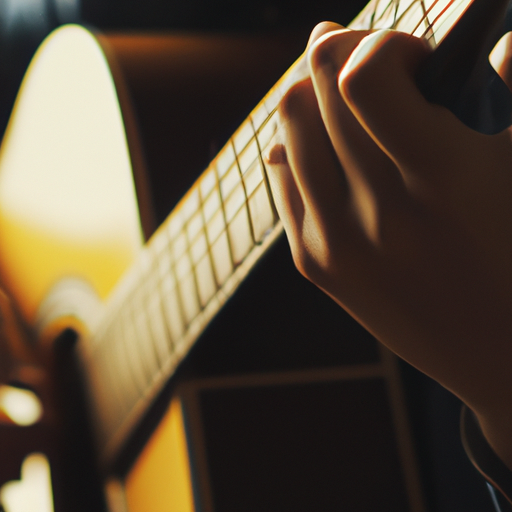
Playing the guitar is a wonderful and rewarding journey. Whether you're a beginner or an experienced player, regular practice is essential for improving your skills and becoming a better guitarist. In this article, we will explore various tips and techniques to help you make the most out of your practice sessions and take your guitar playing to the next level.

Regular practice is crucial for developing your guitar skills. It helps build muscle memory, improve finger dexterity, and enhance your overall playing ability. By practicing consistently, you will gradually become more comfortable with the instrument and gain the confidence to tackle more challenging pieces.

This article aims to provide you with a comprehensive guide to effective guitar practice. We will cover various aspects, including establishing good habits, proper technique, ear training, chord progressions, scales and arpeggios, music theory, playing with others, and maintaining a positive mindset. By incorporating these tips into your practice routine, you will see noticeable improvements in your guitar playing.
Consistency is key when it comes to practicing the guitar. It's better to have shorter practice sessions every day than longer sessions once in a while. Aim for at least 30 minutes of focused practice each day to build momentum and ensure steady progress.
Setting goals is essential for staying motivated and focused during your practice sessions. Whether it's learning a specific song, mastering a particular technique, or improving your speed and accuracy, having clear goals will give your practice sessions direction and purpose.
Before diving into your practice routine, it's important to warm up your fingers and prepare your muscles for playing. Simple warm-up exercises such as finger stretches, chromatic scales, or playing scales in different positions can help prevent injuries and improve your overall playing technique.
Playing with proper technique is crucial for producing clean and accurate sound. It involves correct finger placement, proper posture, and efficient hand movements. By focusing on proper technique from the beginning, you will develop good habits that will benefit you in the long run.
Proper finger placement and posture are the foundation of good guitar technique. Ensure that your fingers are pressing down on the strings with the tips, not the pads. Keep your wrist straight and relaxed, and maintain a natural and comfortable posture while playing.
Mastering various strumming and picking techniques will add depth and dynamics to your playing. Experiment with different strumming patterns, palm muting, and alternate picking to expand your rhythmic and melodic possibilities.
Ear training is an essential skill for any musician, including guitarists. It enables you to recognize and play melodies, chords, and solos by ear, without relying solely on sheet music or tabs. By training your ears, you will become more versatile and adaptable in any musical situation.
There are various tools and exercises available to help you develop your ear training skills. Utilize online resources, such as ear training apps and websites, to practice identifying intervals, chords, and scales. Additionally, transcribing songs by ear is an excellent way to enhance your listening skills.
Allocate dedicated time in your practice routine for ear training exercises. Start by practicing simple melodies and gradually progress to more complex chord progressions and solos. By consistently working on your ear training skills, you will be able to play music more intuitively and expressively.
Learning chord progressions is essential for understanding the structure and harmony of songs. It allows you to accompany other musicians, write your own music, and improvise solos. By familiarizing yourself with common chord progressions, you will have a solid foundation for creating and playing music.
There are many popular chord progressions used in various genres of music. Some examples include the I-IV-V progression, the ii-V-I progression, and the 12-bar blues progression. Explore different progressions and practice transitioning smoothly between chords.
To practice chord progressions, start by learning the basic open chords and their fingerings. Practice transitioning between chords slowly at first, focusing on accuracy and clarity. Gradually increase the tempo as you become more comfortable. Additionally, try strumming different rhythmic patterns to develop your sense of timing and groove.
Learning scales and arpeggios is crucial for developing your improvisation skills, understanding music theory, and building dexterity on the guitar. They provide the foundation for melodies, solos, and chord progressions.
The major and minor scales are the most fundamental scales in music. Practice playing these scales in different positions and across the fretboard. Pay attention to the patterns and intervals, as they will help you navigate the guitar more efficiently.
When practicing scales and arpeggios, start with a slow and steady tempo. Focus on accuracy and clean execution. Use a metronome to gradually increase the speed as you become more comfortable. Additionally, practice playing scales and arpeggios in different keys to expand your musical vocabulary.
Understanding music theory is invaluable for guitarists. It allows you to communicate with other musicians, analyze songs, and compose your own music. By learning the basics of music theory, you will have a deeper understanding of how music works.
Start by learning the fundamentals of music theory, such as notes, scales, chords, and key signatures. Familiarize yourself with the circle of fifths, intervals, and basic chord progressions. As you progress, delve into more advanced topics, such as modes, harmony, and improvisation.
Apply music theory to your guitar playing by analyzing songs, identifying chord progressions, and understanding how different scales and modes can be used. Experiment with incorporating music theory concepts into your improvisation and composition. The more you apply music theory to your playing, the more creative and versatile you will become.
Playing with other musicians is a great way to enhance your overall musicianship. It helps develop your listening skills, improves your ability to play in a group setting, and exposes you to different musical styles and ideas. Collaborating with others can also be a source of inspiration and motivation.
There are various ways to find other musicians to play with. Join local music groups, attend open mic nights, or connect with fellow guitarists online. Networking and reaching out to other musicians will increase your chances of finding like-minded individuals to jam and collaborate with.
When playing with others, listen attentively and be open to different musical ideas. Pay attention to dynamics, timing, and communication. Be respectful and supportive of your fellow musicians. Playing with others is a collaborative process, so be willing to compromise and adapt to different playing styles and genres.
Having a positive mindset and staying motivated is vital for your growth as a guitarist. Learning an instrument takes time and effort, and it's easy to get discouraged along the way. By maintaining a positive attitude and staying motivated, you will overcome challenges and keep progressing.
Stay motivated by setting short-term and long-term goals. Celebrate small victories along the way and reward yourself for accomplishing milestones. Surround yourself with supportive and like-minded individuals who share your passion for music. Explore new genres and styles to keep your playing fresh and exciting.
Overcoming challenges and frustrations is part of the learning process. When faced with difficulties, break down complex techniques or songs into smaller, manageable parts. Practice slowly and gradually increase the speed. Remember to take breaks when needed and give yourself time to rest and recharge. Most importantly, be patient and kind to yourself.
Improving your guitar skills requires consistent practice, proper technique, ear training, knowledge of chord progressions, scales and arpeggios, music theory, playing with others, and maintaining a positive mindset. Incorporate these tips into your practice routine to see significant improvements in your playing.
Remember, learning the guitar is a journey, and progress takes time. Stay committed, practice regularly, and enjoy the process. With dedication and perseverance, you will become the guitarist you aspire to be. Keep strumming, keep learning, and most importantly, keep having fun!